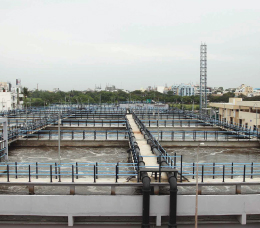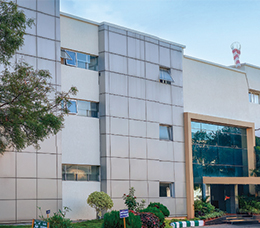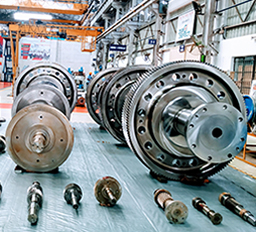Co-generation Business
Triveni continues to put Sugar co-products to productive use, thus also enhancing its revenue stream. Bagasse is a fibrous residue left after crushing of sugarcane and is a key co-product of the Sugar industry. Being a renewable fuel, it does not lead to any net carbon dioxide addition to the atmosphere, and is thus regarded as green fuel.
Triveni currently operates three grid-connected large capacity co-generation plants and three smaller co-generation capacities (incidental co-generation facilities) at its five sugar units, namely Khatauli, Deoband, Chandanpur, Milak Narayanpur and Sabitgarh units. The former three large-sized plants are part of the operations of co-generation, whereas the other three small-sized plants are considered a part of the sugar operations. Triveni's co-generation plants at Khatauli and Deoband utilise highly efficient 87 ata / 515°C steam cycle to maximise efficient usage of bagasse. After meeting the sugar factory's captive requirement, as well as the co-generation plant's auxiliary power requirement, surplus power from these plants is exported to the grid. The Company has power purchase agreements with Uttar Pradesh Power Corporation Ltd. (UPPCL) for all its co-generation facilities.
The co-generation plants at Khatauli and Deoband utilise highly efficient high pressure (87 ata) and temperature (515°C)steam cycles, and are regarded amongst the most efficient cogeneration plants in India. The Company's smaller capacity cogeneration plants operate mostly on medium pressure steam cycles (46 ata/44°C) These plants are designed to conduct fully-automated operations, using the latest Distributed Control System (DCS). Highly experienced and skilled manpower operates these plants, thus ensuring trouble-free efficient operations with high uptime and reliable operations, along with very high operating efficiencies. The Company puts strong emphasis on maintaining excellent management of the boiler feed water quality parameters, to ensure sustained and trouble-free operation of the boiler and the turbine.
Unit-wise capacities of the co-generation plants are as follows:
The operation of the bagasse-based co-generation plant depends, to a large extent, on the availability of bagasse from the sugar operations. This, in turn, depends on cane availability for the crush during the season and efficient operations of the sugar factories. Higher cane availability leads to more season operating days, higher bagasse savings, and therefore longer operation of the co-generation plants. The power tariff has been significantly reduced with effect from April 1, 2019, which is a setback for the co-generation business, and the industry association has approached the Court and the matter is currently sub-judice.
The Company has undertaken an extensive and focussed cane development programme in the command areas of its sugar units, particularly in the past few years. This has led to much better availability of sugarcane in view of the significantly improved yields and corresponding increase in availability of bagasse.
The performance of the co-generation plants at Khatauli and Deoband continued to be excellent during the year, with very high uptime and reliable operations. The requirements of process steam and captive power of the sugar factory operations were fully met, apart from the captive supply.
The Company’s incidental co-generation facilities also performed well and its plants at Chandanpur, Milak Narayanpur and Sabitgarh units recorded good power export in 2019-20. During the year under review, the co-generation units generated 244.20 million units, while the exports to the grid were 145.34 million units. Apart from this, the incidental co-generation units of Chandanpur, Milak Narayanpur and Sabitgarh exported 39.14 million units to the State Grid.
COVID-19
The co-generation operations remained unaffected by COVID-19. As a relief measure, however, the Government has decided to infuse liquidity in the Distribution companies to the extent of ₹90,000 crore, which should also help the UPPCL to clear the power dues of the Company.
The Company's sustained focus on sugarcane development activities in the command areas of its sugar units should lead to continued better sugarcane availability for crushing, resulting in higher operating days of the co-generation plants due to enhanced bagasse availability. The Company is also taking various steps to further improve the efficiency of the sugar plants' operations in order to reduce the process steam consumptions. This will enable more savings of bagasse for enhanced operation days of the co-generation plants.







